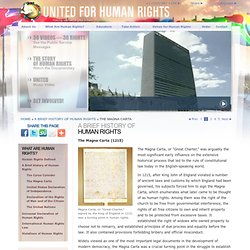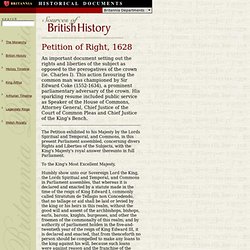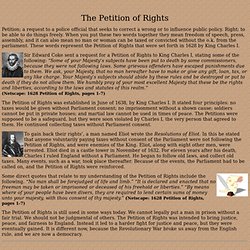

Magna Carta, Petition of Right, History of Civil Liberties. The Magna Carta (1215) Magna Carta, or “Great Charter,” signed by the King of England in 1215, was a turning point in human rights.

The Magna Carta, or “Great Charter,” was arguably the most significant early influence on the extensive historical process that led to the rule of constitutional law today in the English-speaking world. In 1215, after King John of England violated a number of ancient laws and customs by which England had been governed, his subjects forced him to sign the Magna Carta, which enumerates what later came to be thought of as human rights.
Among them was the right of the church to be free from governmental interference, the rights of all free citizens to own and inherit property and to be protected from excessive taxes. It established the right of widows who owned property to choose not to remarry, and established principles of due process and equality before the law. The Petition of Right. British Historical Documents: Petition of Right, 1628. Petition of Right, 1628 An important document setting out the rights and liberties of the subject as opposed to the prerogatives of the crown (ie.

Charles I). This action favouring the common man was championed by Sir Edward Coke (1552-1634), a prominent parliamentary adversary of the crown. His sparkling resume included public service as Speaker of the House of Commons, Attorney General, Chief Justice of the Court of Common Pleas and Chief Justice of the King's Bench. The Petition exhibited to his Majesty by the Lords Spiritual and Temporal, and Commons, in this present Parliament assembled, concerning divers Rights and Liberties of the Subjects, with the King's Majesty's royal answer thereunto in full Parliament. To the King's Most Excellent Majesty, Petition of Rights. The Petition of Rights Petition; a request to a police official that seeks to correct a wrong or to influence public policy.

Right; to be able to do things freely. When you put these two words together they mean freedom of speech, press, assembly, and it can also mean no man or woman can be taxed or convicted without the o.k. from the parliament. These words represent the Petition of Rights that were set forth in 1628 by King Charles I. Sir Edward Coke sent a request for a Petition of Rights to King Charles I, stating some of the following: “Some of your Majesty’s subjects have been put to death by some commissioners, because they were not following laws. Petition of Right.